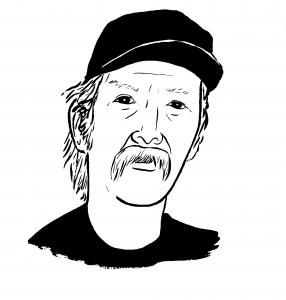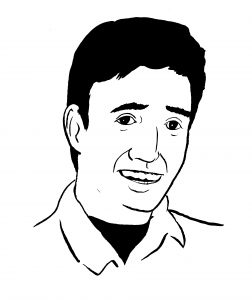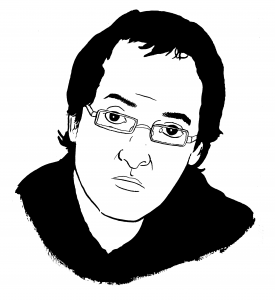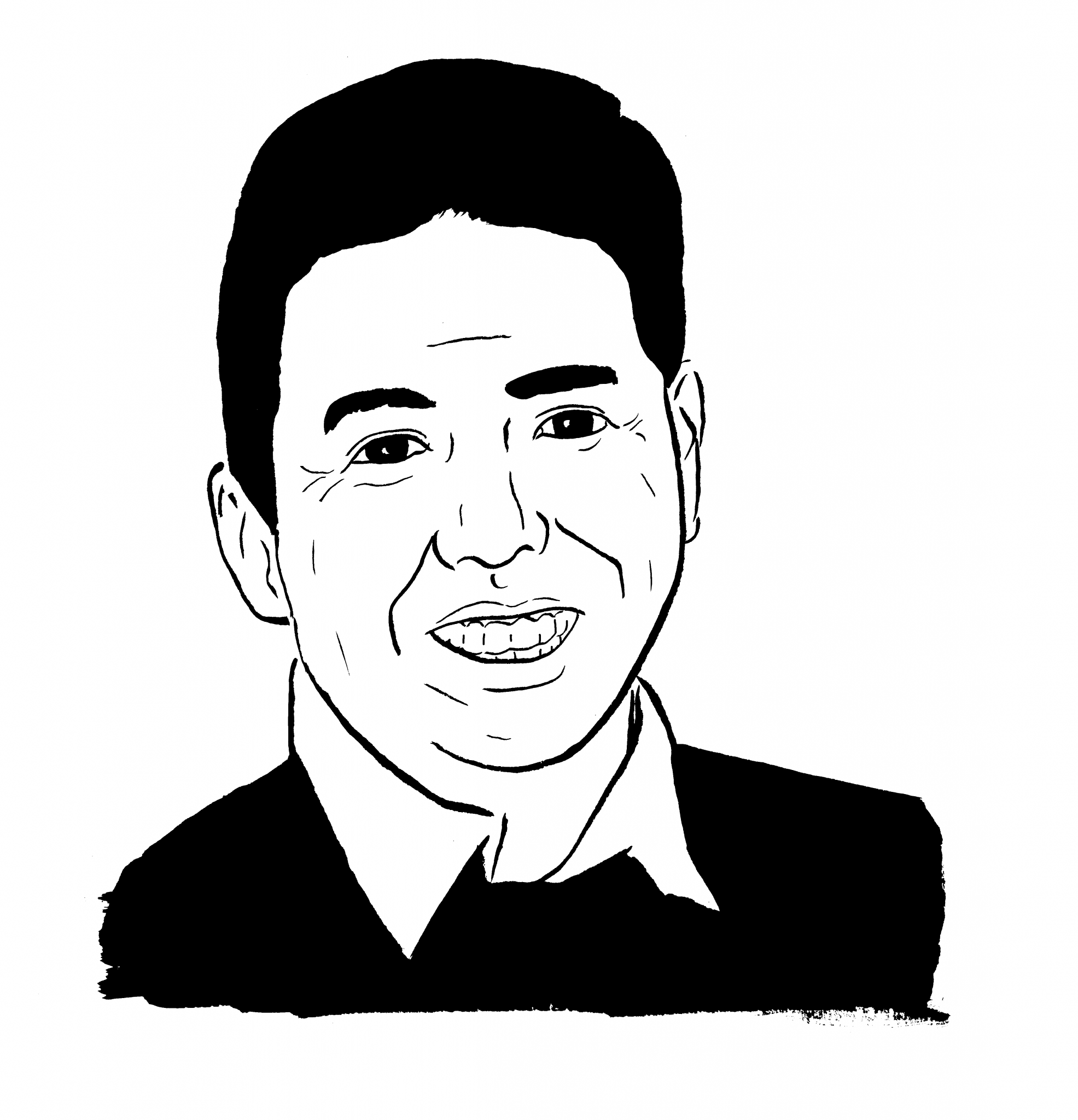Lining 18th Street, in the heart of Pilsen, are the recurrent red, white, and blue signs of mayoral and aldermanic candidates alike. Solis and Sigcho compete for attention among the white signs for Chuy Garcia. I see one “Mújica” sign at a local candy store. The shop owner says people came by to put up the sign and he let them—he can’t even vote in the election because he isn’t a U.S. citizen. As I go into the other shops one by one, I am met with blank stares and shrugs by these superficial endorsers.
“I don’t remember, someone came in to put up a sign and I said, ‘Sure.’ ”
“I tailor Sigcho and Solis’s shirts so I let them put both of their signs up.”
“I don’t care.”
“I don’t know.”
“People wanted to put it up and I had no problem with that.”
“If Solis came in here wanting to put up a sign I would say no, I don’t want him claiming power over my business,” says one shop owner on 18th Street, who asked to remain anonymous out of concern for her business. She has no political signage in her shop window.

She mentioned a newly constructed metal shredder and the $140,000 budgeted for arts and culture in 2013 that Solis still hasn’t paid to local artists as her primary concerns for the election. But when asked which of the other candidates she was going to vote for, she admitted that she didn’t even know the names of Solis’s opponents. She didn’t think the other candidates had done a good job of advertising. “On a personal level,” she said, “it doesn’t feel like the aldermanic race would affect me one way or the other.”
A local landlord criticized the “lack of transparency of Solis’s office,” but did commend Solis on moving the aldermanic headquarters east in the ward to 18th and Blue Island, a central intersection in Pilsen. He cited the redistricting of the ward as an example of “corrupt Chicago politics,” but also wished to remain anonymous because “the alderman will be re-elected and I will have to work with them in the future.”
The landlord described the metal shredder, the nearby heliport project, and the lack of local economic growth as the issues most important to him. But he said he hadn’t seen “much change in the community.” He admitted he was not sure if he will even vote in the upcoming election.
Even if voters are concerned about certain issues, it’s hard to present them with viable alternatives.
“The only way I’m going to get news out of Pilsen is usually to Google search ‘Pilsen,’” the landlord said. “Otherwise, it’s just not out there.”

Made up of Pilsen, Chinatown, University Village, Little Italy, and part of the West Loop, the 25th Ward is a patchwork of disunited neighborhoods. The current alderman, Danny Solis, has been in power for the last eighteen years; Solis was appointed by former mayor Richard Daley when his predecessor was indicted. Solis has been chairman of the Zoning Committee since 2009, which means that he played a part in the redistricting of the 25th Ward that has taken place since the last election in 2011. The redistricting pushed the bustling, art-gallery lined section of Halsted Street in Pilsen and part of Little Italy to the 11th Ward, and brought in land from the Near West Side and the South Loop.
As the incumbent, and as an influential veteran of City Council, Solis is by far the most powerful and well-equipped of all the candidates. However, he is not invincible. In 2011, due in part to the unpopularity of the Solis-supported Fisk power plant in southeastern Pilsen, Solis’s opponent, Cuahutémoc Morfin, a Pilsen community activist, was able to launch a significant challenge against Solis’s incumbency. Morfin acquired more than sixty percent of the vote in the eastern half of Pilsen and the Latino vote overall, while Solis retained overwhelming popularity in University Village and Chinatown. The two went to a runoff, and Solis won fifty-six-percent to forty-four.
This time around, Solis faces five opponents. Edward Hershey is a teacher at Lindblom Math & Science Academy in West Englewood and is backed by the Chicago Teachers Union; he was arrested at a protest against demolishing the Whittier Elementary field house in Pilsen in 2013. Byron Sigcho is an Ecuadorian immigrant, a doctoral candidate in urban education at the University of Illinois at Chicago, a lead instructor at UIC’s Center for Literacy, and a leader of Pilsen Alliance, a neighborhood social justice organization. Jorge Mújica is a community activist and a socialist well-known for his dedication to labor and immigration rights, and is backed by the Hispanic Council of Chicago (the Weekly interviewed him in October). Roberto Montaño is a financial advisor and a former chief-of-staff for Solis.

Solis has more than five times the funds of the second-most-funded candidate, Montaño, with $206,645 filed by press time according to Aldertrack. In municipal elections, recognition is the most important thing money can buy. The more funds you have, the more visible you can be. Sigcho, who had slightly less than $2,500 at press time, says his biggest challenges have been educating people about the ward’s issues and getting recognition. With his amount of money, Solis has the ability to send more flyers, post more advertisements, and do publicity in the 25th Ward than the other candidates. Very few people I spoke to in Pilsen could even tell me who Solis’s opponents in the election were.
Solis didn’t win an initial majority of votes in Pilsen in 2011, however, and he still isn’t terribly popular in the neighborhood. His support for the Pure Metal Recycling metal shredder project, his silence over the $140,000 that was supposed to go to local art projects but has since gone missing, and his unwavering allegiance to Rahm Emanuel aren’t helping in the eyes of many Pilsen residents.
In May 2014, the city’s Zoning Board of Appeals (chaired by Solis) approved plans for a fifteen-acre industrial metal shredder plant after lengthy delays. The metal shredder project poses yet another environmental issue in Pilsen after the Solis-backed coal-fired Fisk plant. Residents are concerned that the shredder, which will be located at Loomis and Cermak, near Benito Juarez High School, could bring traffic congestion, pollution, and health risks to the nearby students and homeowners. The metal shredder would be the second in Pilsen: SIMS Metal Management operates another less than a mile away. Solis supports the shredder project, citing the jobs it will create. The other aldermanic candidates are unanimously opposed.
Solis’s second major political obstacle is the “missing $140,000,” a chunk of the total $1.3 million given to each ward annually to support infrastructure. Solis decided to allocate this money to support local art projects in the 25th Ward as part of the Arts in Public Places Initiative he started in 2012. $16,000 was promised to the Humboldt Park artist collective Pawn Works in 2013, to bring in renowned graffiti artists. $25,000 was promised to Benito Juarez Community Academy for an art project. Though Pawn Works has begun putting up murals in the neighborhood, the $16,000 still hasn’t been paid, and a perplexing total of $140,000 has gone missing. According to Solis’s spokeswoman, in an October 2014 interview with the Reader, the $140,000 is tied up in the “bureaucratic process of the city.” Solis and his spokeswoman declined multiple requests to be interviewed for this story.

On February 6, a community forum between the five aldermanic candidates was held at UIC’s Rafael Cintrón Ortiz Latino Cultural Center. Mújica was there with his impressive moustache and signature baseball cap, Hershey was in jeans, and Sigcho and Montaño showed up in business suits. The fifth candidate, Danny Solis, was not in attendance, reportedly due to a scheduling conflict.
There were about sixty people at the forum, and it felt like a small town meeting—about half of the people there were family members of the candidates or campaign volunteers. Students from the UIC organization United Students Against Sweatshops, who organized the event, posed the questions. They covered topics from immigration to public safety.
Mújica’s diction was powerful and resonated with the audience. He highlighted his successes in leading strikes and used concrete examples of his achievements to underscore his beliefs. “Today, two hours ago, the Golan’s Moving and Storage strikers finally got a settlement,” he said. “I organized the workers, they get an increase in salaries, they get transportation time pay. That’s what I do day to day. I am a worker organizer.”
Mújica, like the other candidates, supports a $15 minimum wage. He promises to push for municipal IDs, which he says would help immigrants applying to deferred action programs. He is anti-TIF and believes that TIF projects are taking away money from schools. He calls for a “moratorium on charters” and supports an elected school board.
Montaño, too, said that a $15 minimum wage is clearly “good economics—we do better when we all do better.” He described his extensive work on immigration and highlighted the positive economic impact of immigration, namely the small businesses immigrants tend to open. He also believes in an elected school board and wants to rein in TIFs, saying they take away from the lifeblood of the schools.
Hershey had some students in the audience. “I’ve helped organize students on the Southwest Side on school closings. I got arrested there, a year and a half ago,” he said in his opening statement. He mentioned Karen Lewis as a model and an inspiration. Though still not enough, he believes that at least a $15 minimum wage is necessary. He is against the closing of neighborhood schools and strongly in favor of electing a school board:
“As a teacher, a personal frustration I would have is that undocumented students would say, ‘Why should I work to get good grades, I’m not going to afford college?’” he said. “And other students have the best grades, jump over every hurdle we set out for them and yeah, they come back to me, they’re just working jobs, they have no money. So yeah, we need to have equal opportunity. First of all, college should be free.”
“I’m an immigrant, activist, and community member,” Sigcho said of himself. “I am glad to see parents in the room, fighting for their schools. This is about community, I want to include everyone.” He cited the problem of families being displaced from Pilsen because of rising rents. He has made education for immigrants one of his primary focuses, and has organized a community TIF forum to educate citizens on the confusing mechanism of Chicago taxation so that they could contribute to the discussion. One of his volunteers, a man in his late fifties, told me that Sigcho is helping him to get his GED.

“What I will do is what I’ve been doing. I would like to continue to do that in City Council,” he said. “We need to make sure the people are making the decisions.”
At one point, about halfway through the forum, Montaño said forcefully: “One of us is going to win. Danny Solis is not going to win.” Next to him, Hershey made a face, shrugged, and mouthed “maybe” to the audience.
Not many voters were at the forum, and information on the unfamiliar candidates isn’t easily accessible—citizens would have to go out of their way to do enough research to feel confident about making a decisive vote. People care about the issues, and the problems in the community over which the alderman has influence, but in the end, many potential voters are just too busy to actively seek out information about the race, beyond the mailings that arrive on their doorsteps and the ads that inundate their televisions—that is to say, beyond what Solis’s campaign finance buys for them. That barrier to information only fuels the sense of indifference exhibited by many 18th Street shop owners. “I don’t care.” “I don’t know.” “People wanted to put it up and I had no problem with that.”
As the landlord said, “There’s a little bit of apathy, because not much changes.”

